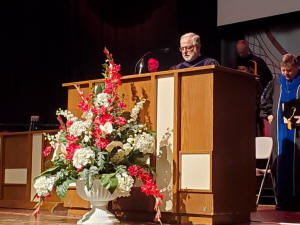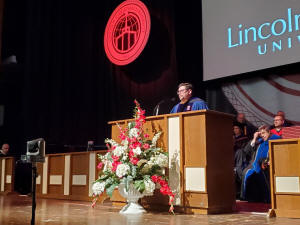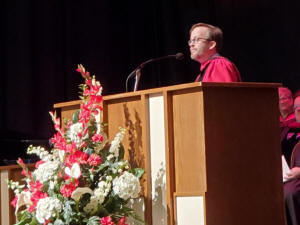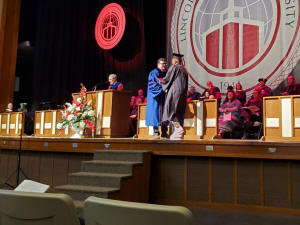|
_small.jpg)
There were 61 undergraduate degrees awarded at the 10 a.m. ceremony.
And, 84 graduate degrees and three doctoral degrees were awarded at
the 1 p.m. ceremony. These numbers include those who were graduating
in absentia.


Both ceremonies began with a time of congregational singing. Dr.
Richard Knopp, Professor of Philosophy and Christian Apologetics led
the invocation. Dr. Knopp said we gather for a time of celebration
of God’s greatness, faithfulness and sacrifice of his son. We also
celebrate these graduates and remarkable achievements considering
many obstacles they faced. Their personal persistence and patience
are worthy of praise. The foundation of their faith is Jesus Christ,
and they fulfill the dreams of various men and women who devoted
their lives to this institution.

LCU President Silas McCormick welcomed everyone to a community
celebration. McCormick told graduates, not only do we celebrate you,
but we celebrate the joy we have investing in you. The works so many
people have done here investing in you make it possible to you to be
here. [We celebrate] all the many ways you have overcome obstacles
and disappointments to achieve what you achieve today. He said it is
an honor having you participate in this ceremony with us.

Next, McCormick introduced keynote speaker Dr. Timothy Dalrymple,
who has a long list of accomplishments. Dalrymple is President and
CEO of the magazine Christianity Today. McCormick said Dalrymple is
one of those leading an evangelical institution that is helping to
have conversations in love and grace those of us in education share.
These are hard times for these conversations, but McCormick said,
having the resources of those willing to have them is an important
part of our experience as believers.
Before the keynote address, Worship Ministry graduates Wenjun Yuan,
Kelsey Taylor and Vann Barnette shared special music, singing
“Thanks Be to Our God.”

As Dalrymple began his keynote address, he said others have told him
the students were not there to listen to him and were unlikely to
remember what he said. What Dalrymple asked them to remember are
three words: tapestry, weaver and storyteller.
On an overhead screen, Dalrymple showed a tapestry known as “The
Lady and the Unicorn” that has a series of six panels. The first
panel shows a noble lady with a lion on her left and a unicorn on
her right.
Each panel shows the same characters and tells a story using the
various senses. Dalrymple said these are not disconnected scenes on
the meditation on the joys of touch, taste, smell, hearing and
sight.

In the final panel, the lady lays aside her necklace, ready to
fulfill her desires. Dalrymple said the meaning of these panels have
been discussed for years. What started as a celebration of the
journey of the flesh becomes a journey of the soul into the deeper
longings on the spirit.
What Dalrymple said is represented is a tapestry stretching over
multiple panels. Then there is a weaver of the tapestry and a
storyteller who must interpret and reinterpret what the tapestry
means.
With that tale in mind, Dalrymple said he wanted to share two
stories. The first was his own. The second is the very familiar
story of Joseph.
Years ago, Dalrymple’s dreams were unfolding in front of him like a
blazing tapestry of many colors.
At fifteen, Dalrymple was a national championship gymnast who
imagined Olympic glory. Six days a week, Dalrymple trained
tirelessly with other Olympic hopefuls soldiering on through
countless injuries. He had all the skills he had to succeed.
In 1996, Dalrymple was at the Olympic trials on the verge of
achieving his dreams. Then Dalrymple fell from a high bar and broke
his neck, ending his gymnastic career.
The Biblical story of Joseph also has a tapestry. Joseph was a
brilliant and charismatic young man of dreams. He had the world at
his fingertips, but then his brothers threw him in a cistern and
sold him to slave traders bound for Egypt. A life filled with so
much promise was literally thrown into the pit.

The reason Dalrymple was telling these stories is that for the
graduates today is a day of dreams fulfilled and dreams scarcely
begun. Dalrymple said many of them today are in the early tapestry
of their lives. Some may have the next thing lined up. Others are
not sure what will come next and are frightened. It is hard to know
what the next panel in their tapestry will bring. He asked, “What if
that is good news?”
The first key point Dalrymple shared was “You cannot comprehend the
tapestry of your life.”
Though Joseph who had early ideas of where God would take him, there
was no way he could have known the twists and turns fate had in
store.
The last few years have taught us we cannot know what the next panel
of the tapestry will be. We do not know what will happen next year
or next month.
After Dalrymple’s injury, he wrestled with the purpose of all those
years of training. With his dreams dashed, Dalrymple had to figure
out what to do. Friends told Dalrymple since he learned how to be
successful at one thing, he could also be successful doing something
else.
The first panel of Dalrymple’s life was being reinterpreted based on
what was to come next. Maybe the first panel was not about achieving
one shining moment of Olympic glory. Maybe it was about the skills,
the character and the strength Dalrymple would need for the other
panels of his life.
The threads of Dalrymple’s tapestry were soon woven together in a
new way. Dalrymple believed God was calling him to be a Christian
voice teaching philosophy in a secular university.

As Dalrymple went about getting the degrees he would need to teach
philosophy, he thought he was the one weaving the tapestry.
What Dalrymple believed is that the end of his gymnastics career was
just a momentary diversion from an upward career. Everything was
going beautifully as Dalrymple was winning prizes and presenting at
conferences.
Then in 2008 the economy collapsed bringing changes to Dalrymple’s
life. As Dalrymple prepared to apply for jobs, it seemed as though
God told him no. In response, Dalrymple said, “What do you mean no?
Isn’t this what I have been preparing for?”
[to top of second column] |

Then something unexpected happened when colleagues
approached Dalrymple. These colleagues were ready to launch a
website called Patheos, a marketplace for religious ideas with the
hope of making the marketplace better. Patheos was intended “to
thoughtfully engage the public square” and “find creative ways of
sharing the gospel in the media marketplace.”
Coming on board to launch the website, Dalrymple said it wove
together all his passions and experiences in an entirely new and
better way. He said Patheos has become the world’s largest religions
website.
After Joseph was sold into slavery, he found himself in the home of
Potiphar moving towards success. Joseph was earning Potiphar’s trust
and becoming a person of influence. Then Potiphar’s wife turned
against Joseph and Joseph was thrown into jail.
As Joseph faced challenges, Dalrymple said Joseph had to wonder what
happened to the story of his life and the tapestry he was weaving.
While in jail, Joseph interpreted the dreams of a cupbearer who was
a fellow inmate. A few years later when Pharoah needed a dream
interpreted, the cupbearer remembers Joseph. Pharoah sends for
Joseph and Joseph’s moment of opportunity has come.

Some may be wondering how in the world am I going to weave the
threads of my life into something beautiful and meaningful that
gives glory to God?
The second key point Dalrymple then shared with graduates is “You
are not the weaver of the tapestry of your life.” It is
fundamentally not your responsibility. There is no way you can know
the circumstances that will confront you next year, not to mention
20 years from now.
The point Dalrymple was trying to make was not a philosophical or
theological one about free will. What Dalrymple said he meant is it
is your job to be faithful day to day and strive with the utmost
integrity to follow Jesus Christ. God is the ultimate weaver of the
tapestry. Lives are all the more meaningful and beautiful when woven
by God’s skilled and loving hands.
In Dalrymple’s life, each successive panel of the tapestry has
reinterpreted all those before. All the ingredients and the threads
have been woven in surprising and sometimes breathtaking ways.
First, Dalrymple helped develop Patheos. Next, he founded a creative
agency called Polymath that produced media content for museums,
foundations, businesses and ministries. This work took Dalrymple’s
gymnastic experience, university experience, ministry experience and
Patheos experience and wove it all together in a completely
unexpected way.
Then Dalrymple was contacted to see if he was interested in the
position of President and CEO of Christianity Today. Initially,
Dalrymple did not feel the call, but was told to pray about it.
Dalrymple tried to weave his own tapestry until September 2018 when
he heard the words “my bride is beautiful.” She needs a story told.
Those words fell upon Dalrymple’s shoulders like a weight of bricks.
For all its flaws and failings, Dalrymple said the church remains
the primary instrument of God’s redemptive grace and work in the
world.

The question for Dalrymple was who will tell the stories of men and
women following the call of Christ and making a difference.
Dalrymple had not talked to his wife about the job at Christianity
Today for a while and was unsure how to approach her. However,
before Dalrymple said anything to his wife, she turned to him and
said she thought he should take the job. She felt God wanted them to
go there and they should be willing to go.
In Joseph’s story, his life changed when he went before Pharaoh.
When Pharaoh asked Joseph if he could interpret his dream, Joseph
had a fascinating response. Joseph said, “I cannot do it, but God
will give Pharaoh the answer he desires.”
By then, Joseph had begun to realize he was not the weaver of the
tapestry of his life. Dalrymple said it was Joseph’s job to be
faithful and a receptacle to God’s will. It was God’s job to
accomplish a purpose through Joseph.
Once Joseph interpreted Pharaoh’s dream, Pharaoh made Joseph the
second most powerful in the empire. Joseph saved countless lives.
When Joseph’s brothers came to him during the famine, Joseph was
able to provide for them. In revealing his identity to his brother’s
Joseph said it was God who had put him there. Joseph later told them
“you intended to harm me, but God intended it for good.”
What Dalrymple said Joseph finally realized is that he was not the
weaver of the tapestry of his life. Joseph was the witness and the
storyteller.
As Dalrymple ended his address, he said what it means for the
graduates on the verge of a new chapter is to be not afraid. You are
not in the place of God. God has his own plans for your life and his
own promises. God has his own tapestry that his great skill in great
love is weaving together, even now, for each one.

His final key point was “You are not the weaver of the tapestry of
your life. You are the storyteller.” You are the one who can look
back and see the work of God. You can see how all the past weaves
together who you are now. [You can see how] the work you are given
to do today will bear witness to the world of the work God has in
and through your life.
There are those who may say it all worked out for Joseph, but what
if it doesn’t for me. For those who are fearful, Dalrymple reminded
them God works all things together for those love him and are called
according to his purpose. Quoting Proverbs 3:5-6, Dalrymple said,
“lean not on your own understanding; in all your ways acknowledge
him and he will make your paths straight.’
Dalrymple said Christians should approach their lives with
confidence and joy. Not a single thread is wasted in the tapestry
because God will make use of it. Dalrymple ended by saying the story
God gives you to tell will be a good story.
After the message, McCormick said it was a privilege to confer
degrees and awards to the class of 2022.
Acting Undergraduate Academic Dean Dr. Brian Messner said those with
a grade point average of 3.5-3.69 were graduating Cum laude. Those
with a GPA of 3.7-3.89 were graduating Magna cum laude. Those with a
GPA of 3.9-4.0 were graduating Summa cum laude.


Dr. McCormick handed out degrees to each student individually. As
graduates crossed the stage, Messner shared each student’s plans and
any special honors or awards. Some have jobs lined up, while others
are still seeking positions or planning to continue their education.
The morning’s benediction was given by Mikala Love who thanked God
for each graduate and asked God to be with them in their various
pursuits furthering the kingdom. She thanked God for their
willingness to love others.
At the afternoon ceremony, Graduate and Seminary degrees were handed
out by Dr. Peter Verkruyse, Interim Vice President of Academics and
Dr. Barney Wells, Graduate and Seminary Academic Dean.
In continuing a long-time tradition, each seminary graduate was
presented with a towel to "to wash the feet of the world,” reminding
them of their call to serve
The other graduate students received a bookmark that says, "Live
your mission," reminding them to live their mission in the world.
Doctor of Ministry graduates were given a basin that represents and
complements the symbolism behind the Seminary’s towel presentation.
LCU is “a Christian higher education community whose mission is to
nurture and equip Christians with a Biblical worldview to serve and
lead in the church and the world.” The graduates are challenged to
go out and fulfill this mission. Even as the school is
restructuring, the mission will stay the same.
[Angela Reiners] |